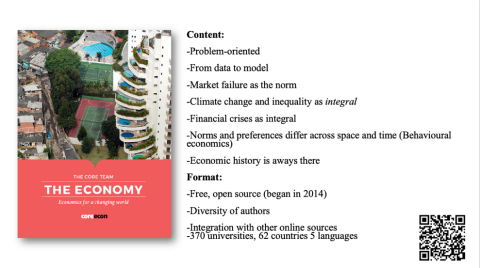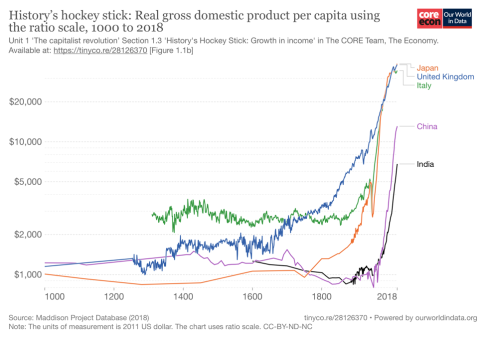Putting climate change and inequality first in teaching economics
In the latest post in our mini-series highlighting how our alumni are researching and tackling climate change, Dr Ramin Nassehi argues the need to turn economics teaching on its head and start with real-world challenges, rather than abstract theories.

Returning to ODID for 2022’s climate-themed alumni day, I welcomed the opportunity to talk about the urgent need to overhaul economics teaching, especially in relation to income inequality and climate change. As a lecturer with University College London (UCL) Economics, I work with CORE Econ and Centre for Teaching and Learning Economics in several exciting education projects that aim to reform the undergraduate economics curriculum. Ironically, I introduced these new projects in the same ODID classroom in which I had my development economics lectures.
I started with a question for the audience: what’s wrong with the teaching of economics? The outpouring of responses almost felt like a therapy session, where people pointed out many familiar problems with standard economics teaching. These included:
- The teaching of economics is detached from lived experiences: It starts with abstract general principles of human behaviour (optimisation in face of scarcity), instead of talking about the real world and the pressing problems of our times, like climate change, sustainability and inequality.
- It holds competitive markets as the norm. Hence any instance of market failure, such as global warming or financial crises, is treated as a deviation from the norm. This means such topics are usually dealt with as stand-alone chapters at the end of economics text books.
- Behavioural economics is given a side treatment, in the sense that humans are assumed to be rational and optimising by default.
- Little attention is paid to economic history and the contextual details of capitalism, with the assumption that markets work the same everywhere.
CORE Economics: a real-world approach
I then contrasted the standard approach to teaching economics with the new approach we are following at UCL as part of the CORE Econ.

The CORE Econ project has been initiated as a response to growing student demands for reform of economics teaching in the aftermath of the 2008 financial crisis. This centres on a free open-source textbook now used in 387 universities in 66 countries, available in seven languages. The textbook turns the standard teaching of economics on its head. Instead of starting with the general principles of economic behaviour, the book opens with the economic history of the world, using the hockey-stick graph that shows the exponential increase in GDP under capitalism in recent centuries.

The book celebrates the “great enrichment” made possible by capitalist systems, but at the same time, points to the negative side-effects of this enrichment by presenting data on income inequality, climate change and financial crises. So, from the start, it weaves the study of markets together with the study of the environment, inequality and crises. Realities such as climate change are integral to the whole CORE approach, rather than added in separate chapters at the end. Also following a data-driven approach, it introduces students to economic facts (rather than theory) at their very first encounter with economics, placing emphasis on understanding and solving the economic problems that we face today as the main subject matter of economics, instead of uncovering universal laws of economic behaviour. This problem-oriented approach is evident from the cover of the book (inequality in São Paulo) and its name (“The Economy” instead of “Economics”).
Interactive content representing reality
Another distinguishing factor of CORE Econ is that it does not take competitive free markets as a default or a starting point. Unlike standard textbooks, it starts the analysis of markets with a monopoly model and then moves to competitive markets. The chapters on labour markets integrate bargaining power as an essential element in wage setting. Such an approach is more intuitive and realist, as most markets that students encounter in their daily lives are subject to various frictions, barriers and power bargaining. In addition, the book takes the role of institutions and culture seriously by highlighting the context-specificity of markets in different societies, hence it speaks of varieties of capitalism, rather than a universal model of markets.
After highlighting the distinguishing contents of the CORE Econ, I spoke a little bit about its novel format. Apart from being free online, the book has been produced by a diverse network of scholars around the world. This decentralised model of content production has made the book less focused on the analysis of rich economies and thus less Western-centric compared to conventional textbooks. Also, unlike typical textbooks, the chart and tables of the book are closely integrated with external datasets such as “Our World in Data”. This integration not only helps the book to remain updated empirically, but also gives students the agency to discover interesting economic facts on their own by “playing with data”.
We are still in the very early days of reforming economics teaching, but I ended my talk with optimism. We must start our teaching from real-world problems and address the questions around equality and sustainability that motivate so many students to take up economics in the first place. Above all, economics teaching must equip them to confront these pressing challenges.
To find out more, access CORE resources and join the growing global community of CORE teachers and learners, visit https://www.core-econ.org and Centre for Teaching and Learning Economics. The Economy is also published by Oxford University Press.
This post draws on a presentation given by Dr Nassehi, who completed the MPhil in Development Studies at ODID in 2011, at our alumni event, "Climate Change and Development: Insights from the ODID community", in June 2022.

